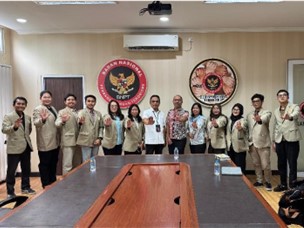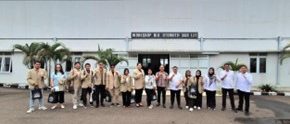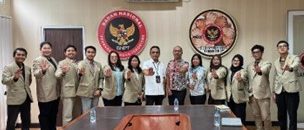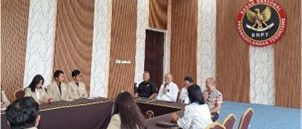
Bogor, February 3rd 2025 – The Peace and Conflict Resolution Master Program, Graduate School of Gadjah Mada University, conducted a study visit to the National Counter-Terrorism Agency (BNPT), located in Bogor Regency, West Java. The visit was directly welcomed by the Deputy for Enforcement and Capacity Building, Police Inspector General Ibnu Suhendra, S.I.K., accompanied by Prof. Dr. Irfan Idris, MA., the Director of Prevention, along with his staff and team.
During the discussion session, BNPT outlined the developments in global terrorist networks emerging within terrorist groups in Indonesia, as well as the national strategies employed by BNPT in countering terrorism, such as counter-radicalization, counter-ideology, deradicalization, and law enforcement. BNPT also emphasized the soft approach to detect early terrorist threats that may disrupt the security stability of society. This approach has successfully made Indonesia a country with low terrorism impact, according to the 2024 Global Terrorism Index, ranking 31st out of 54 countries.
Furthermore, the deradicalization program run by BNPT for former terrorists aims to deconstruct the ideologies or understandings related to radicalism. About 90 percent of those who undergo this program successfully reintegrate into society, although it cannot be denied that there may be chances of relapse.
During the Q&A session, MPRK UGM students were very enthusiastic in asking several questions, especially concerning the role of BNPT as the coordinating agency in handling terrorism cases in Indonesia. One interesting question was about the continuity of returning former terrorists from conflict countries like Syria, many of whom have family members involved.
In response to this, BNPT has coordinated with various parties to ensure that the return process runs smoothly. However, they could not confirm when this process will take place, as BNPT is still considering various aspects, one of which is the social reintegration of former terrorists into society.
At the end of the discussion, Dody Wibowo, a lecturer from MPRK, expressed gratitude for the opportunity to engage in direct discussions with BNPT. He emphasized that those involved in terrorism often come from situations where welfare and justice are unmet. MPRK stresses resolving conflicts through peaceful means while terrorism attempts to resolve conflicts through violence.
After the discussion session, the MPRK students were guided by the staff to visit the National Terrorism Countermeasures Museum Adhi Pradana, located in the BNPT complex. This museum serves as an educational medium that facilitates learning about counter-terrorism strategies and also raises public awareness of the dangers of extremism. It houses collections of objects, photos, and various historical information, including waves of terrorism worldwide, post-bombing conditions, and government efforts to counter such threats. MPRK students were also invited to reflect on the importance of maintaining unity and peace through an inspirational film screening in the museum’s auditorium.
It is hoped that this visit provides new insights, especially for students, in efforts to maintain peace. BNPT also encourages everyone to join in preventing and countering individuals or groups that promote violence, hatred, and intolerance in society.
The visit conducted by MPRK together with BNPT aligns with the Sustainable Development Goals, particularly Goal 4: Quality Education, Goal 16: Peace, Justice, and Strong Institutions, and Goal 17: Partnerships for the Goals.
Written by: Tia Mega Utami
Edited by: Arni Wistriatun






